Missing persons cases: Court gives PM Shehbaz two months for recovery
6 min readISLAMABAD: The Islamabad High Court (IHC) has given the federal government to months to present six missing persons, with Prime Minister Shehbaz Sharif assuring the court of all-out efforts for their recovery.
PM Shehbaz Sharif, who appeared before IHC Chief Justice Athar Minallah, said that while he couldn’t assure the court of the recovery of all six people, he said that no stone would be left unturned. “I will not give any lame excuse.”
The Islamabad court was hearing identical petitions for the recovery of missing persons, including journalist Mudassir Naaru and Rawalpindi-based businessman Masood Janjua.
The IHC had, at an earlier hearing, giving the prime minister till September 8 to present the six missing persons. The order stated that the PM Shehbaz would have to appear in person to explain if the State failed to produce the six missing people.
Prime Minister Shehbaz Sharif was accompnied by Federal Minister for Law and Justice Azam Nazeer Tarar and Attorney General (AGP) Ashtar Ausaf. Relatives of missing persons, including the five-year-old son of missing journalist Mudassar Naaru. Amina Masood Janjua, who turned to activism after her husband Masood went missing in 2005, was also in court.
State failure
During the hearing, Justice Minallah invited PM Shehbaz Sharif to the rostrum and remarked that the lack of response from State on the issue of missing persons and enforced disappearences was the premier’s responsibility.
He said that hearings on enforced disappearances have been taking place for several months with the government failing to provide answers.
“If the State itself is unaware how its citizens disappear without a trace, then what should be done,” he said while asking the premier whether the court should someone else who could answer that question. He added that the court had referred the matter to the cabinet several times without any headway on the recovery of the people.
In a reference to Pervez Musharraf, the chief justice remarked: “A chief executive who ruled the country for nine years boasted about selling people to the US.”
In the original English edition of Musharraf’s autobiography ‘In the Line of Fire’, the military ruler wrote about the payments Pakistan received from the American CIA for handing over prisoners.
The chief justice remarked that the governmetn had set up a committee on enforced disappearance, on the IHC’s recommendation, to come up with a policy on the issue. He added that a commission also constituted but it had also failed to deliver justice.
“The executive’s job is to ensure the safety of citizens. For a person to go missing is the biggest form of torture.”
‘Above the law’
Justice Minallah inquired whether law-enforcement agencies are above the law. He observed that there was a perception that state institutions were involved in enforced disappearances. When the State doesn’t know the whereabouts of its citizens, then who should the question be put to, he continued. “Should someone else be called?”
He said that all those such people should be held to account. “The issues of governance can only be resolves once the Constitution reigns supreme.”
Justice Minallah pointed at Mudassir Naaru’s five-year-old son and said that the court has no answer for the small child who keeps coming to the court for the hearings. “This child was sent to the previous prime minister but nothing happened. What should this court do?”
He added that the court was confident that the premier would provide a solution. He added that the court does not like to summon the elected prime minister. “You are working for flood victims, and the court appreciates that you appeared before it on this important issue.”
I’m accountable: PM Shehbaz
He said that his priorities included implementation of court decisions, visiting flood-affected areas and to meet and rally victims.
On the issue of missing persons, Shehbaz said that such cases have been continuing for nearly two decades. He said that he had met Naaru’s son and he was saddened when I had no answer to give to this child who wanted to meet his father. “It is my responsibility to find this child’s father. I will give it my best shot. I am accountable to this court and the people of Pakistan.”
On the formation of the committee, he said that it would submit its report which would be based on facts, while assuring the court of overseeing sessions of the committee. Shehbaz said that he had been imprisoned twice in the last four years.
He said that even though he had been chief minister, he remains a very simple individual. “I can understand what these affected families are going through. I can understand the pain and suffering of the missing persons,” he said while assuring the court of personally involvement in the case. “God willing, no one will remain missing.”
Collective responsibility
“We are all responsible for the families of the missing persons. If the State was responsible, no one would have come here,” remarked Justice Minallah. “If someone is a terrorist, he must be brought before the law.”
PM Shehbaz responded that his family – including his brother Nawaz Sharif – were affected when a dictator came to power. “We have raised the issue of Baloch students [who have gone missing].”
On which the court said that it had formed a commission for Baloch students in April. “The commission has not called any meeting till date. The complaints of Baloch students are still coming.”
Justice MInallah added that it was also the provincial chief executive’s responsibility to ensure that none of its citizens go missing.
At this point, Law Minister Azam Nazeer Tarar came to the rostrum and said that the prime minister was trying to solve this problem. “A permanent solution would come out of political negotiations.”
The court responded that civilian supremacy would ensure that.
Later, the court allowed the prime minister to leave in order to attend to his responsibilities.
‘Failure to deliver’
The court observed that those in positions of authority say they have nothing to do with enforced disappearances. “Instead of resting on their laurels, public office holders should fulfil their responsibilities or quit if they are unable to do so.”
He said that while the court respects the Parliament, the body had failed to deliver. “It can even remove the chief executive.”
Justice Minallah cited an earlier order in which the court assured all chief executives that it would not interfere. “The court would only give judgments that expedite their efforts.”
At this, former PPP Senator Farhatullah Babar complained about the obstruction in the legislation. Justice Minallah responded that the PPP had also been in power. “Your chief executive failed to see the problem. If all institutions work according to the law, then such a situation would not arise.”
He continued that those who have made sacrifices for the restoration of the constitution failed to act on the issue of missing persons. “If the chief executive says that the agencies are not under my control, then he is violating his oath. If he cannot keep the oath, then he should leave office. If there is interference, these things will happen.”
Meanwhile, Amna Janjua told the court that the Commission for Inquiry on Enforced Disappearances had failed to deliver while demanding the removal of Justice (retired) Javed Iqbal from the post of commission chairman.
The court gave two months to the federation and said that the committee should get time if the prime minister, law minister, interior minister and attorney general appeared.
Later, the hearing was adjourned till November 14.
Strict security arrangements
Earlier, strict security arrangements were made in view of Prime Minister Shahbaz Sharif’s arrival at Islamabad High Court.
All the roads around the Islamabad High Court were cordoned off while the entry of unrelated people were barred from coming to the court room.
The court only heard cases pertaining to missing persons, with other cases on the cause list cancelled.
For the latest news, follow us on Twitter @Aaj_Urdu. We are also on Facebook, Instagram and YouTube.







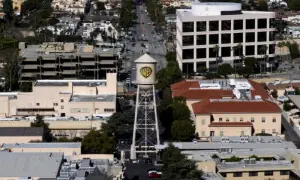









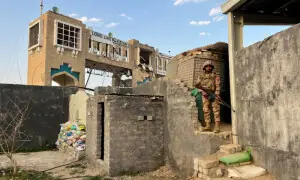
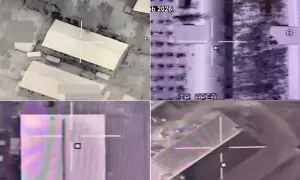
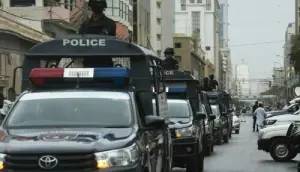
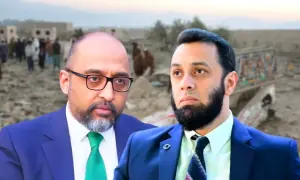
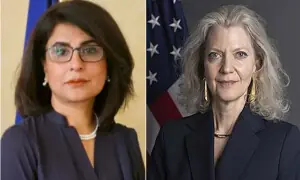
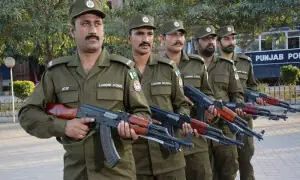
Comments are closed on this story.